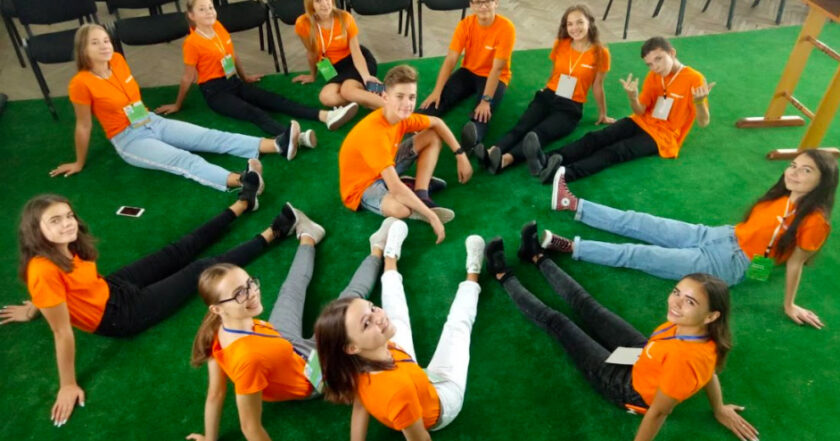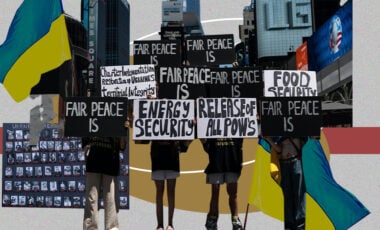No Waste Kherson Region: how schoolkids created eco-initiative and won €12,500 grant
The problem of waste pollution is one of the biggest problems in Ukraine. When an established system works against the environment and people, it may seem like nothing can be done. But teacher Olha Demchenko and her students from Kherson prove that we can fix everything. The critical thing is to act.

Have you ever wondered what happens to your trash after it leaves your home? Ukraine's Ministry of Regional Development reports that only 3 (!!!)% of garbage is recycled in Ukraine. Almost all waste ends up in landfills or reservoirs and poisons the environment and us. Year after year, Ukraine enters the list of countries with the most considerable amount of garbage per capita, and the Black Sea is considered the most plastic-polluted sea in Europe.
How can you improve the situation when you do not influence the complete and final solution to the problem? What can you personally do to improve the condition of your city, village, or just your home? The students of school No. 32 in Kherson found an excellent way out, thanks to which they could win a grant for 12.5 thousand euros. Rubryka asked Olha Demchenko, a biology teacher who started the project with the students, how the school achieved such success.
From idea to action
The story of ordinary Kherson schoolchildren began with participation in the Zero Waste School Ukraine competition. Love for the native land and understanding of the Black Sea coast's condition pushed Olha Demchenko and her students to participate in the environmental contest. Having fulfilled the primary requirement of the competition—creating a video—the eco-team of school No. 32 went to Kyiv for training.
"Our team started with a small group—4 students and me," says Olha Demchenko. "For three days, we were taught to create projects, deal with waste, and sort properly. The best speakers told us about the environmental situation. We were shocked. Therefore, when we returned home, we began implementing our project, No Waste Kherson Region." As a result, the schoolchildren and their teacher independently collected funds and 100 volunteers to clean 14 km of the wild Black Sea beach. "We realized that we are a team and a powerful team and that we can achieve concrete results," says Ms. Olha.
Two years have passed since the launch of the first project. The group grew to 18 people, held many clean-up campaigns, and held training where activists taught others how to manage waste properly. "At the end of the second year, we realized that the measures we used were spot-on and one-time and that we wanted to do something more. To do this, we needed funds," Olha Demchenko explains. Armed with the knowledge of writing grant applications that they acquired at the training, the Kherson Zero Waste School developed an idea that led the team to win the No Waste Black Sea Coast grant for 12.5 thousand euros. The opportunity was offered to the countries of the Black Sea Basin, including Bulgaria, Romania, Russia, Georgia, Ukraine, and Turkey.
The team's idea was, first, to hold an eco-festival for entrepreneurs operating on the Black Sea coast, where the team would be able to offer them alternative eco-products. Second, the team proposed to create a plastic workshop, where they plan to produce plates from which you can create benches, reusable containers for waste, and address plates for houses, building the brand of Kherson as an eco-city.
No opportunities? Create them yourself!
Olha Demchenko says one problem pushed their team to the idea of creating their small recycling center. After carrying out the No Waste Kherson Mountains project, which taught the communities near the coast how to manage waste properly, the team saw that people in the villages were ready to sort and care about the environment. However, because the small towns are far from the city, and there are no local recycling and sorting centers, all waste is still taken to the landfill. In general, there is no logistics to accumulate waste to the extent that it would be profitable for carriers to take it to processing plants. The workshop is an outlet through which the team will try to clean the coast from plastic.
Donors have already transferred funds for the purchase of machines. The Zero Waste School team already has raw materials (50 kg of PET bottle caps) and has found volunteers ready to work in the workshop. However, they don't have premises where they could start their activities. "We appealed to the city council to provide us with such a space, but it has been three months since, and we still have no place to start our work in this direction," the head of the team says. Despite the logistical problems, the children don't lose enthusiasm and continue their activities.
Ms. Olha told Rubryka that she and the children started from complete ignorance about the problem of waste and sorting and reached tangible, practical steps and results. After the children learned about the climate, they realized their future was at risk and needed to act. Starting with themselves, the children first inspired their parents to sort. Now they incite their buildings and entire streets to change. At events organized by their team, they promote eco-consciousness and the importance of solving environmental problems among all citizens. With their example, children destroy the stigma about garbage, which many people are still ashamed to deal with and want to get rid of as soon as possible, as something dirty and vile.
"Small steps are the beginning. Then you want to do more, and you start immersing yourself in information, finding people who also understand the topic. You form such a coalition around you, and you feel inspired to do good deeds," the leader of the Zero Waste School adds. If you want to take the first steps towards eco-consciousness, start doing it now. Take an example from our heroes and begin with small but actual steps, and most importantly, learn more about the environmental situation and tell others about it. As the members of the Zero Waste School team have shown, everyone can contribute to improving their future.





















































